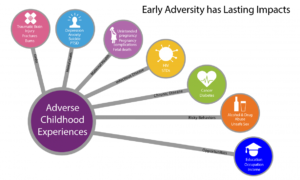Dr. Marian Hatcher
Shared Hope Policy Consultant
Ambassador-at-Large, United Nations
Last month was Mental Health Awareness month and as annual attention to this issue prompted introspection about my own personal experiences, I began to think about how the mental health needs of trafficking survivors so often intertwine with the need for federal vacatur and post-conviction relief for trafficking victims.
While the focus on mental and behavioral health overall gained traction beginning in the 70’s, 80’s and 90’s, finally resulting in the current Substance Abuse Mental Health Services Administration (SAMHSA) established in 1992, the focus on human trafficking didn’t manifest until the year 2000 with the Trafficking Victims Protection Act (TVPA). Even then, it has taken over two decades for human trafficking to become widely understood as a crime that impacts people across the United States and isn’t just a crime that “happens over there,” no less how mental health plays a role in creating vulnerabilities to trafficking.
Has the formal attention and organization of governmental agencies, programs and initiatives focusing on trafficking made a difference in how trafficking victims are viewed and provided services? Yes, and no. When we look at how long it took for the puzzle pieces of mental health and human trafficking to be named, and considering from 1949 to 2000 discussions around mental health didn’t yet have the framing of human trafficking (although many of the impacts on survivors were inevitably part of those conversations), it makes sense that mental health responses to human trafficking victims have been lacking in critical ways and the mental health needs of trafficking victims/survivors are only recently becoming central to how we respond to human trafficking.
On a personal level, both my mother and I have backgrounds which require us to check the box of having a mental health history. Childhood and adult trauma triggered both of our experiences. I was molested by a trusted family member at the age of seven, which perverted my sense of intimacy and I was also a victim of domestic violence as an adult.
Mental health issues are an “outside looking in” multilayered system of good stressors, bad stressors, pain, suffering, joy and feelings one can’t name or label. In Asheville Insights, Chelsea Jennings stated: “From the outside looking in, it’s hard to understand. From the inside looking out, it’s hard to explain.” While this quote is related to an “immersion” trip experience, I feel the words profoundly describe the mental health journey and what trauma means to trafficking survivors.
“There are many complex and varied issues that affect survivors of trafficking, both medical and otherwise. An article by Lederer and Wetzel (2014) found alarming rates of injury and illness among sex trafficking victims. It does not require a stretch of imagination to infer that these adverse physical and psychological health impacts are the direct result of trauma from victims’ time within the sex trade. For example, a peer-reviewed article on traumatic brain injury (TBI) found that prostituted women suffer rates of TBI at much higher rates than the national average. (Farley, Banks, Ackerman, & Golding, 2018).”[1]
Trafficking is a traumatic experience often resulting in verbal and physical abuse, lack of control, loss of liberty, loss of family and more. It stands to reason, if there is an existing mental health problem, additional trauma(s) would exacerbate that. Substance use, existing or introduced in a trafficking environment also has an impact. Survivors look normal until worn down. At the beginning of my trafficking experience, other people on the street said I looked like the “po po.” At the end I was considered just another “crackhead.”
It’s the wearing down, the lack of good nutrition, lack of sleep, lack of good hygiene, lack of love, lack of empathy…lack lack lack. Where does the lack push you if not to the point of no return? Do I have a memory, of, even if off in the distance, of normalcy to instill hope that it is still achievable? The buildup of lack–physical and mental abuse, torture that is a “prostitution/sex trafficking experience”— creates a wall preventing healthy choices, education, stability, love, care, safety, nutrition, financial security, etc.
I was fortunate, in that I did have a normalcy to claw through the fog of trauma, drugs, guilt, shame, confusion etc. I had a family that never stopped looking for me when I was missing for almost two years. I also had a formal education and career, that I would sometimes have glimpses of, through the pain of beatings and rape and hunger.
There is a shade of gray for each person’s trauma. The hues too numerous to quantify. The names of mental health diagnoses are so many. Anxiety, depression, bipolar disorder, OCD, oppositional defiance, borderline personality, PTSD, complex trauma and so on.
Where in this unsavory recipe for disaster, do we realize trafficking victims are surviving, often living exploitative lifestyles with or without nice trappings. These experiences are certainly harsh in many cases, but often so subtle they appear as “willing” participation or cooperation to those without clinical training or personal experience.
What does that mean when it’s time to step out of the darkness of trafficking, into the often blinding light of life? Mainstream society? Family? Motherhood? Employment? School? Financial health? Criminal justice ramifications of victimization that often exist long after trafficking while gaps in post-conviction relief persist? How do we remedy these harms so survivors can heal?
For me, I was able to emerge from the burden of my criminal history by seeking executive clemency from the Governor of Illinois. However, I am fortunate not to have had federal charges, in which case I would have had to seek an executive pardon from the President of the United States. What a daunting hurdle for survivors of exploitation and abuse to have to face in order to not carry a criminal record as a constant reminder of their victimization? This is why I am now an advocate for federal vacatur.
In the Victim Offender Intersectionality (VOI) report, which I contributed to as member of Shared Hope’s JuST Response Council, there are actually many opportunities for a “just response” to criminalized trafficking survivors, but these can’t happen until…
Until the millions of grey hues in the color pallet of pain that is trafficking are understood.
Until the impact of unimaginable sexual violence trauma bonds is considered.
Until there is less bias and more connective tissue between law enforcement, prosecution, and victim services.
Without this, we will continue to face barriers.
So, what can we do? We must wear them down with the truth and a greater understanding of the impact of mental health on human trafficking. And until federal legislation models/mirrors or learns from many states’ efforts to enact vacatur, survivors with federal convictions will be treated unfairly.
[1] Marian Hatcher et al., Exited prostitution survivor policy platform DigitalCommons@URI, https://digitalcommons.uri.edu/dignity/vol3/iss3/10/ (last visited Jun 16, 2023).


 Written by Barbara Amaya with Holly Austin Gibbs
Written by Barbara Amaya with Holly Austin Gibbs






